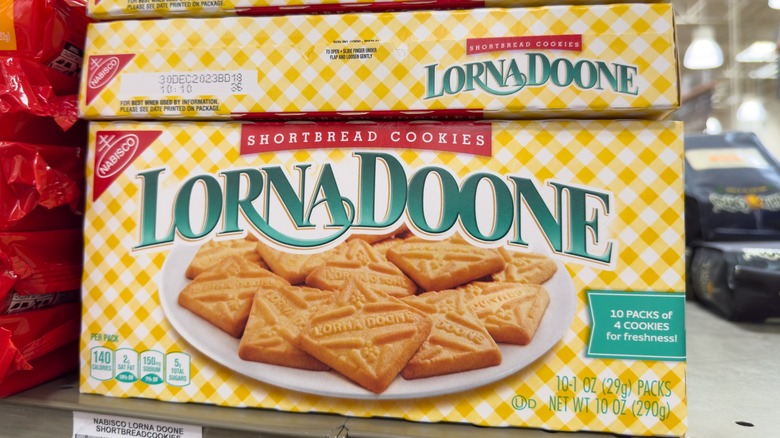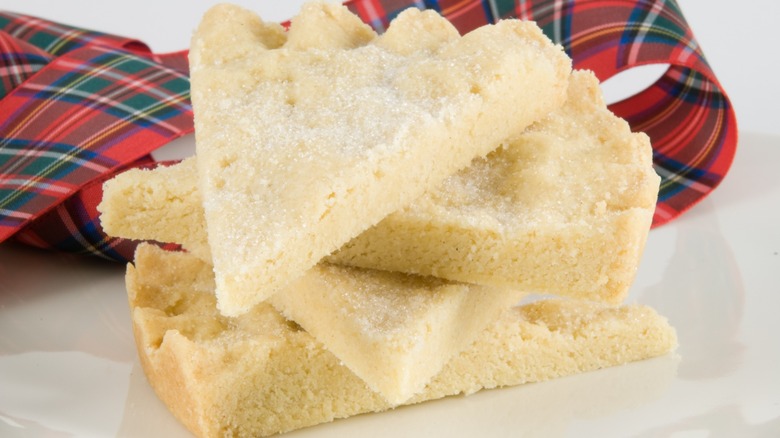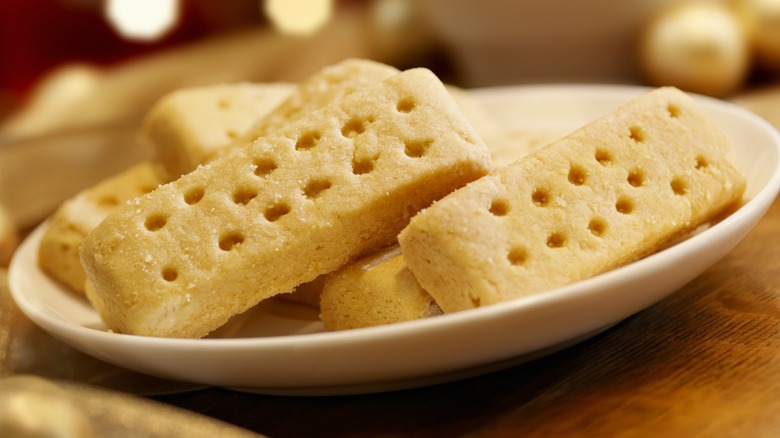Here's How Lorna Doone Cookies Got Their Name
If you love shortbread (okay, so pretty much all of you), you've probably had more than a few of Nabisco's Lorna Doone cookies. If so, you might have wondered, "Who was this Lorna Doone — the Scottish grandmother who invented this recipe?" And honestly, you might want to let it go at that. Certainly, the cookie's manufacturer would approve of this speculative assumption. But, should you choose to chase the Lorna Doone name origin story down, you will find yourself lost in a labyrinth of misdirection, associative branding, and litigation.
Lorna Doone cookies were (likely) invented by an Irish immigrant and named after a popular romance novel written by an Englishman which features a heroine with a Scottish name who turns out not to be Scottish at all, but who was instead abducted as a baby and raised by bandits in southern England. When tracking down the Lorna Doone name origin story, it's probably best to reach out to the company that first introduced the product in 1912 — Nabisco, now a subsidiary of snack giant Mondelēz Global.
"No record exists as to the exact motivation behind the selection of that name," a Nabisco marketing communications representative told The Chicago Reader in 1998, "But in those days shortbread biscuits were considered a product of Scottish heritage, and the Lorna Doone character was symbolic of Scotland." (At least the company put a plaid pattern on the box, which sort of resembles a tartan.) But surely shortbread at least originated in Scotland, right?
Shortbread probably didn't originate in Scotland
The fact is that dead-simple sweet bakes (which Americans refer to as cookies and the British call biscuits) consisting of flour, butter, and sugar were being baked all over England, Ireland, and Scotland for hundreds of years before gaining favor with the 16th-century's ill-fated court of Mary, Queen of Scots – at least according to legend. Even the traditional Scottish shortbread name, "petticoat tails," so-called because the triangularly-shaped bakes resembled ladies' underskirts, was likely a corruption of the French term "petite galettes," or "little biscuits." (No matter how you shape 'em, try our Scottish shortbread recipe.)
Regardless, shortbread's association with Scotland was to be cemented by the first-known publication of a recipe in 1736. A Scotswoman known only as Mrs. McLintock included a recipe for "Short Bread" in her "Receipts for Cookery and Pastry-Work" (via the University of Glasgow Library blog) which included not only the usual suspects of flour, butter, and sugar but also "a Mutchkin of good Barm," which turns out to be the yeast-inflected froth scraped off fermenting malt liquor, which acts as a leavening agent. Early shortbread recipes also often included citrus zest, not unlike our lemon shortbread cookies.
Lorna Doone, the Scottish-adjacent cookie
In the early part of the previous century, an Irish immigrant named Emily Malloy (probably) solidified the shortbread recipe that Nabisco adopted for manufacture (after first figuring out how to shape the individual cookies for mass production using wooden blocks). The only thing left to do was name the new product. Some bright bulb — lost to history — decided to name Nabisco's new shortbread cookie after Lorna Doone, the aforementioned beautiful, virtuous, and fictional protagonist of English author R.D. Blackmore's 1869 novel of the same name.
Lorna is thought to be descended from the powerful (and villainous) Scottish Doone clan, but this turns out to be false in a bodice-ripping reveal. Moreover, Blackmore's novel is set in a remote part of Devon, which is not to be found in Scotland at all but rather in southwest England. So, good job all around. Oh, and in a hilarious postscript, a 2022 class-action lawsuit accusing Mondelēz Global of perpetuating fraud by fooling consumers into thinking that Lorna Doone cookies are Scottish (the packaging features a tartan!) and thus contain real butter (that would also be a big no) was summarily dismissed. At least PETA got Nabisco to uncage their animal crackers!


